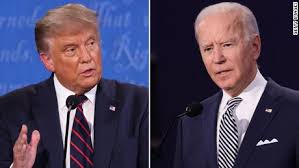
2020 First Presidential Debate: A snapshot of Drury student and professor reactions
Community, News October 11, 2020, Comments Off 57The first of three debates between presidential candidates President Donald Trump and Former Vice President Joe Biden was held on Sept. 29, 2020. The event was divided into six segments which lasted 15 minutes with Chris Wallace of Fox News moderating as well as choosing the discussion topics, which included the questions asked within those topics. Each candidate had two minutes to answer the initial question, which left the remaining time in these segments for open discussion between them. The debate lasted approximately 90 minutes.
Each campaign agreed to the rules of the debate. According to Wallace’s introduction, “none of the questions has been shared with the Commission [on Presidential Debates] or the two candidates.” Though Wallace chose the segment topics, they were, and are, issues forefront in the public eye. These topics were: the Supreme Court vacancy which included healthcare, COVID-19, the economy, race which included racial violence, Trump’s and Biden’s records and election integrity.
Dr. Daniel Ponder, L.E. Meador Professor of Political Science and Director of the Meador Center for Politics and Citizenship, said the debate was “unlike anything we have seen before in the modern era… never has there been the lack of decorum and disregard for the rules that the campaigns themselves agreed to, particularly by President Trump.”
Dayton Doudican, the President of the Drury College Republicans, disagrees. Though he says there was no clear winner of the debate, he cites what he calls the “degradation of political discourse in our country.” Doudican says the debate structure is a particularly “ineffective debate format.” He argues that the 15-minute segments do not give candidates enough time to substantially “rationalize their views.” Doudican feels that this type of event was “designed for the candidates to be able to give their predetermined statements and sprinkle in a dog-whistle or jab at the opponent.” He does agree with Ponder that the event “turned into a nearly unwatchable hour and a half of mud-slinging, name-calling, and universally disrespectful conversation.”
Dr. Jeff VanDenBerg, Director of the Middle East Studies program and coordinator of the Model United Nations program, weighed in, saying his “initial reaction to the debate was shock and disappointment. Shock, because it went off the rails so quickly and relentlessly. Disappointment because the American people deserve far better than what they witnessed Tuesday.” He is referring to the innumerable instances in which both candidates interrupted and talked over the other as well as the moderator. VanDenBerg was most concerned when he heard the “President of the United States tell a violent hate group to ‘stand down and stand by.’” He is directly quoting Trump’s response to Wallace’s question regarding white supremacy and militia groups.
Bryan Valencia, a Computer Science major and a junior at Drury, feels confident “in my assertion that Biden came out as the winner.” His initial thoughts were frustrated by the “extremely unprofessional” conduct of both candidates, though he felt some of the comments made by Biden were “well deserved.” Valencia was disappointed that more issues weren’t discussed in-depth, but applauds Biden’s habit of “looking directly at the camera and encouraging the American people to vote…It felt surreal seeing Biden look directly at the camera and prod the American people to reconsider if they want President Trump as their leader.” He believes this, along with his stated pride in his son, shows the candidate’s character.
The second presidential debate is scheduled for Oct. 15, though there is some uncertainty regarding its continuation. Ponder questions, since both President Trump and the First Lady have tested positive for the coronavirus, if these final debates will, or should, occur at all. He is interested to see if there will be a change in venue, be it in-person or virtual.
VanDenBerg is more concerned about the President’s “attack on the legitimacy of the election process.” But he is quick to set us straight, since “there is no evidence of systemic fraud in voting by mail, including in those states that send ballots to all registered voters.” His greatest fear, coming out of this first debate, is the implication by the President of “voter intimidation and suppression.” This goes hand-in-hand with President Trump’s refusal to denounce white supremacy.
While there is confusion and frustration surrounding the debate, there is still hope of a bright future—whatever that future might hold. Valencia is looking forward to the next two debates and hopes for more in-depth issue discussion, while Doudican hopes to see better debate structure following what he views as a failed format.
VanDenBerg hopes that “students recognize that democracy is not a spectator sport. It works only when citizens vote, engage with important issues, and hold governments accountable.” What we want to change can be—through policy and direct discourse with our local and federal political leaders. We elected them to speak for us. We must now make them speak for us.